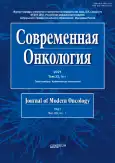New developments in the treatment of follicular lymphoma/ marginal zone lymphoma (according to the Congress of the American Society of Hematology – 2020)
- Authors: Babicheva L.G.1
-
Affiliations:
- Russian Medical Academy of Continuous Professional Education
- Issue: Vol 23, No 1 (2021)
- Pages: 172-184
- Section: CLINICAL ONCOLOGY
- URL: https://journals.rcsi.science/1815-1434/article/view/70486
- DOI: https://doi.org/10.26442/18151434.2021.1.200748
- ID: 70486
Cite item
Full Text
Abstract
Relevance. Follicular lymphoma (FL) and marginal zone lymphoma (MZL) are the most common variants of indolent non-Hodgkin lymphoma (iNHL). Despite the adequate choice of the first-line therapy, 10 – 15% of affected patients with iNHL develop refractory disease, and in most of the cases the relapse of the disease among the others patients is detected, and each subsequent remission is shorter than the previous. According to the data of the National LymphoCare Study Group, the relapses that can occur during the first 2 years (POD24) after the beginning of the first-line therapy with R-CHOP in patients with FL, as well as with MZL, have a negative impact on the prognosis: 5-year overall survival in these patients decreases from 90 to 50%. The arsenal of therapy options is actively expanding along with a deep understanding of the biological basis of the disease development. At present, the most topical problem remains the choice of the best approach for each patient – the personalization of the therapy. The review includes the data from clinical trials concerning FL and MZL treatment presented at the Congress of the American Society of Hematology in 2020. There are a large number of studies concerning new anticancer drugs in the world, such as monoclonal antibodies to different targets on the surface of B-cells, macrophages, bispecific antibodies, antibody conjugates, immunomodulators, BCR signaling pathway inhibitors (Bruton tyrosine kinase, PI3K inhibitors), immune checkpoint inhibitors and many others.
Conclusion. The development of weighting approach for the choice of therapy will give a chance to patients with FL and MZL to stay alive up to the «next era» of new effective anticancer drugs. Future strategies, according to the current studies, show the trend away from the cytotoxic chemotherapy in iNHL therapy.
Full Text
##article.viewOnOriginalSite##About the authors
Lali G. Babicheva
Russian Medical Academy of Continuous Professional Education
Author for correspondence.
Email: lalibabicheva@mail.ru
ORCID iD: 0000-0001-8290-5564
Cand. Sci. (Med.)
Russian Federation, MoscowReferences
- Yellala A, Lyden ER, Nutsch H, et al. Thirty-Five Year Follow-up Analysis of Follicular Lymphoma Patients Treated through the Nebraska Lymphoma Study Group: Prognostic Factor Analysis and Outcomes. Blood 2020; 136 (1): 7–8. doi: 10.1182/blood-2020-142743
- Khurana A, Mwangi R, Ansell SM, et al. Estimates and Timing of Therapy Initiation during the First Decade for Patients with Follicular Lymphoma Who Were Observed at Diagnosis. Blood 2020; 136 (1): 7–8. doi: 10.1182/blood-2020-141011
- Dong N, Saeed H, Isenalumhe L, et al. Initial Treatment Vs Watch and Wait in Advanced-Stage Follicular Lymphoma in the Rituximab Era - an Analysis of the National Cancer Database (NCDB). Blood 2020; 136 (1): 44. doi: 10.1182/blood-2020-138749
- Perri S, Lee DG, Freeman CL, et al. Rituximab Monotherapy Compared to Observation in Patients with Newly Diagnosed Asymptomatic Advanced Stage Follicular Lymphoma: A Retrospective Population-Based Analysis. Blood 2020; 136 (1): 23–4. doi: 10.1182/blood-2020-136457
- Mondello P, Strati P, Merryman RW, et al. R-CHOP Versus R-Bendamustine with or without Rituximab Maintenance in Newly Diagnosed Follicular Lymphoma Patients with High SUV at Baseline PET. Blood 2020; 136 (1): 39–40. doi: 10.1182/blood-2020-136438
- Zinzani PL, Samaniego F, Jurczak W, et al. Umbralisib, the Once Daily Dual Inhibitor of PI3Kδ and Casein Kinase-1ε Demonstrates Clinical Activity in Patients with Relapsed or Refractory Indolent Non-Hodgkin Lymphoma: Results from the Phase 2 Global Unity-NHL Trial. Blood 2020; 136 (1): 34–5. doi: 10.1182/blood-2020-134851
- Zinzani PL, Flinn IW, Yuen SLS, et al. Venetoclax-rituximab with or without bendamustine vs bendamustine-rituximab in relapsed/refractory follicular lymphoma. Blood 2020; 136 (23): 2628–37. doi: 10.1182/blood.2020005588
- Assulin S, Kim WS, Sehn LH, et al. Mosunetuzumab Shows Promising Efficacy in Patients with Multiply Relapsed Follicular Lymphoma: Updated Clinical Experience from a Phase I Dose-Escalation Trial. Blood 2020; 136 (1): 42–4. doi: 10.1182/blood-2020-135839
- Chaves Kh, Jacobson CA, Sehgal AR, et al. Retreatment With Axicabtagene Ciloleucel (Axi-Cel) in Patients With Relapsed/Refractory Indolent Non-Hodgkin Lymphoma in ZUMA-5. Blood 2020;136 (1): 34.doi: 10.1182/blood-2020-135871
- Alderucco JP, Beaven AW, Shouse G, et al. Frontline Bendamustine and Rituximab in Extranodal Marginal Zone Lymphoma: An International Analysis. Blood 2020; 136 (1): 2–3. doi: 10.1182/blood-2020-137620
- Hsu A, Zayac A, Kurt H, et al. CD5 Expression in Marginal Zone Lymphoma (MZL) Predicts Worse Outcomes with Rituximab (R) but Not with Bendamustine/Rituximab (BR). Blood 2020; 136 (1): 50–1. doi: 10.1182/blood-2020-134498
- Coleman M, Andorsky DJ, Yacoub A, et al. Patients with Relapsed/Refractory Marginal Zone Lymphoma in the MAGNIFY Phase IIIb Interim Analysis of Induction R2 Followed By Maintenance. Blood 2020; 136 (1): 24–5. doi: 10.1182/blood-2020-134363
- Opat S, Marcus Robert, Portell CA, et al. Phase 2 Study of Zanubrutinib (BGB-3111) in Patients with Relapsed/Refractory Marginal Zone Lymphoma. Blood 2019; 134 (1): 5256.doi: 10.1182/blood-2019-122629.
Supplementary files



































